英语语法之形容词及词组
英语语法形容词和副词

5)句子中有助动词或be动词时,副词一般位 于助动词或be动词之后。如: The visitors have just arrived. 这些游客已经到达了。 The bus is always crowded. 车里总是拥挤的。
Exercise
2)形容词用在系动词之后,名词+系动词+形
容词,如: These flowers are red.这些花是红色的。(形 容词red在句中放在系动词be之后。) Bob looks smart today.今天鲍勃看上去很精神。
3 形容词用在不定代词后面。 Cathy found something strange in the magic box. 凯西在魔盒里发现了奇怪的东西。
much
副词的用法
(1)副词修饰动词时,通常位于被修饰动词
的后面。如: We should study hard.我们应该努力学习。 You walk too fast.你走得太快了。
(2)副词修饰形容词时,通常放在形容词
的前面。如: The boy is too young to go to school.那个 小孩子太小,不能去 上学。 Mark Twin is a very funny man.马克吐温是 一个非常有趣的人。
1) My father( ). A、works hard B、hard works C、work hardly 2) The dress is( ). A、beautiful quite B、quite beautiful C、quite beauty 3)Tom speaks English( ). A、well so B、well very C、so well 4)I ( )him speak English. A、often hear B、hear often C、hear usually 5)She ( )beautiful. A、so is B、is very C、very is
小学英语语法之 形容词

小学英语语法之形容词-CAL-FENGHAI.-(YICAI)-Company One1英语语法之形容词形容词是用来修饰或描述名词(或代词),表示人或事物性质、状态和特征的词。
、一、形容词的分类:简单形容词 e.g. big, small, windy, cold, fine, black, old, happy…复合形容词 e.g. good-looking, kind-hearted, warm-hearted二、形容词的位置1.通常放在形容词前面Alice is a good student at school.2.用在系动词的后面Joyce’s dress is nice.3.用在不定代词后面There is something wrong with the watch.三、形容词的排列顺序描绘形容词→大小(长短高低)形容词→形状形容词→年龄(新旧)形容词→颜色形容词→国籍形容词→材料形容词→用途(类别)形容词→名词a tall fat English teacher四、形容词的比较等级1.形容词的三个比较等级: 原级,比较级,最高级表示二者相比“等于”时用原级;二者比较有优势之分时用比较级;三者或三者以上的比较“最……”的最高级。
2.形容词比较级的构成TEST写出下列单词的比较及最高级long______________________ good_______________________busy______________________ big________________________beautiful_________________________ late_________________________3.形容词比较级的用法原级用于两个人或事物的比较,常用结构:“as+形容词原级+as”意为“和……一样”Joyce is as tall as Alice.比较级用于两个人或事物的比较,其形式为“形容词比较级+than”,意为“比……更……”English is easier than math.最高级用于三个或三个以上事物之间的比较,其形式为“the+形容词最高级+比较范围”,意思为“最……”Lucy is the eldest in the classroom.TEST 用所给词的适当形式填空1.This is _______________pear on the tree.(big)2.My aunt is getting ___________and ____________.(fat)3.Nancy is ______________girl in my class.(beautiful)。
初中英语语法之形容词,副词

初中英语语法之形容词&副词初中英语语法之形容词&副词形容词副词的原级、比较级和最高级1、分类:形容词和副词有原级、比较级和最高级三级。
2、规则变化:(1)单音节和部分双音节形容词和副词,在原级的后面加上er,est构成比较级和最高级。
a)直接加er,est :b)以重读闭音节结尾的,要双写最后一个辅音字母,后加er,est:c)以辅音字母+y结尾的,先把y改为i再加上er,est:(2)两个音节或两个以上的音节的,在原级前加more / most.3、不规则变化:原级比较级最高级good好的better更好的best最好的well好;(身体)好的,bad,badly糟糕的,糟糕地worse更糟糕的,更糟糕地;(身体)更不舒服的worst最糟糕的,最糟糕地;(身体)最不舒服的ill(身体)不舒服的many许多的(可数)more更多的;更most最多的;最much许多的(不可数);非常little少的less更少的least最少的far远的;远地farther更远的;更远地farthest最远的;最远地further进一步的(地)furthest最深刻的(地)4、形容词和副词的原级、比较级和最高级的用法:(1) 讲述某人/物自身的情况时,用原级。
基本句型是:主语(sb./sth) + 谓语动词+(very/too/so/quite/rather…) + 形容词/副词原级+….如:He is very oldnow. 他现在很老了。
They ran quitefast. 它们跑得相当快。
The weatherlooks rather bad. 天气看上去相当糟。
I am sohappy! 我是如此的快乐!☆表示两者之间没有差别时,使用句型:主语(第一个人物) + 谓语动词 + as + 形容词/副词原级 + as + 第二个人物+….如He is as excited as his younger sister. 他和他妹妹一样兴奋。
初中英语中考语法专题之形容词
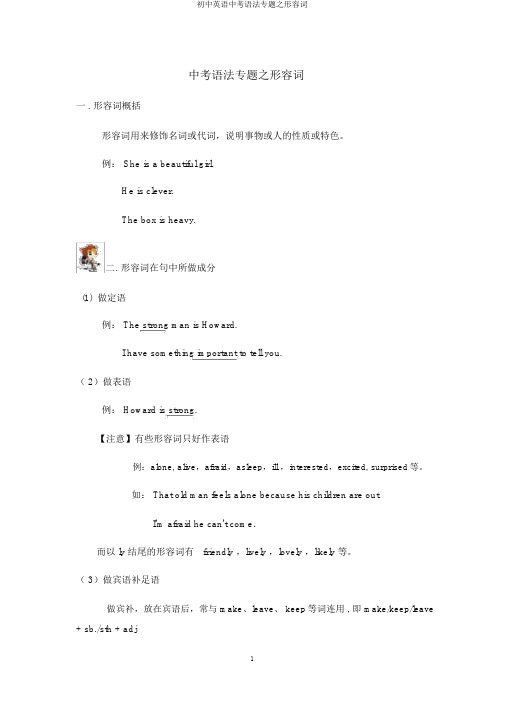
中考语法专题之形容词一 . 形容词概括形容词用来修饰名词或代词,说明事物或人的性质或特色。
例: She is a beautiful girl.He is clever.The box is heavy.二.形容词在句中所做成分(1)做定语例: The strong man is Howard.I have something important to tell you.( 2)做表语例: Howard is strong.【注意】有些形容词只好作表语例:alone, alive,afraid,asleep,ill ,interested,excited, surprised等。
如: That old man feels alone because his children are out.I'm afraid he can't come.而以 ly 结尾的形容词有friendly ,lively ,lovely ,likely 等。
( 3)做宾语补足语做宾补,放在宾语后,常与 make、leave、 keep等词连用 , 即 make/keep/leave + sb./sth + adj例: Howard keeps himself strong.三、形容词与其余词类的地点关系(1) 形容词修饰 something, anything, nothing, everything等不定代词时,形容词放在名词后。
[根源 :例: I have something important to tell you.Is there anything interesting in the film.Can you find anywhere quiet?He has been sent to somewhere particular.Did you see anybody else? 你还看到他人了吗 ?四、某些形容词能够和定冠词连用,表示一类人或事物,其作用相当于一个名词,如: the young(年青人),the poor (穷人),the rich (富人)。
英语语法之形容词和副词

形容词和副词一、形容词和副词的作用1.形容词(adj.)修饰名词形容词(adj.)修饰名词时,有两种位置:1紧挨着被修饰的名词,做定语。
例:This is a wonderful world.(形容词wonderful修饰名词world)We are now living in a beautiful new house.(形容词beautiful和new修饰名词house)2置于系动词之后,做表语。
例:Their sleeping bags were warm and comfortable.(形容词warm和comfortable修饰名词sleeping bags)2.副词(adv.)修饰动词、句子、其他的形容词或副词例:Roy acted quickly.(副词quickly修饰动词act)Suddenly,one of the children kicked a ball.(副词suddenly修饰整个句子)It rained continually and it was often bitterly cold.(1.副词continually修饰动词rain;2.副词bitterly修饰形容词cold)The students from elite universities catch up very quickly.(1.副词quickly修饰动词catch up;2.副词very修饰另一个副词quickly)备注:一般情况下,形容词后加“ly”,就变成对应的副词。
例如:happy-happi ly、angry-angri ly、rude-rude ly。
例:生气的男孩生气地喊。
→The angry boy shouted angrily.二、形容词和副词的比较级形容词和副词的比较级分为:1)最高级(最...)2)比较级(更...)3)原级比较(一样...)1.形容词/副词的最高级:the+adj./adv.的最高级(+介词短语,表示比较的范围)“(...范围内)最...”,通常用于三者或以上的比较例:My younger sister is the tallest one in her class.(最高级变化形式:adj./adv.+est)The most serious problem of the project is the lack of power.(最高级变化形式:adj./adv.前加the most)注意:the+adj./adv.的最高级(+in+地点、场所)the+adj./adv.的最高级(+of+比较的对象)例:He is the tallest in our class.He is the tallest of all the students.练习:1)Which is the longest river____the world?2)This is the finest picture____them all.3)This stereo is the most expensive____all the ones in the shop.4)He is the best boxer____our town.答案:in;of;of;in2.形容词/副词的比较级:adj./adv.的比较级(+than+比较的对象)“(和...相比)更...”通常用于两者之间的比较例:I am taller than you.(比较级变化形式:adj./adv.+er)Air tickets are more expensive than train tickets.(比较级变化形式:adj./adv.前加more)Sometimes machines can perform better than human beings.(good比较级的不规则变化:better)注意:比较的对象要一致。
英语语法之形容词
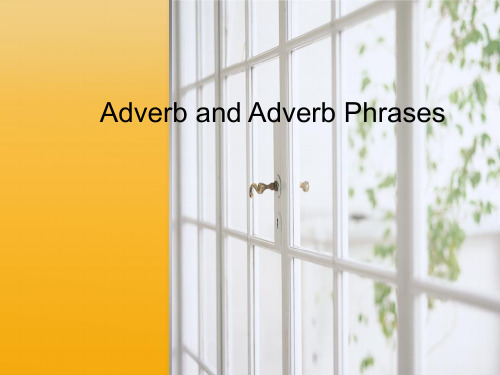
不带修饰语的much有时也可能用在肯定句中修饰动词,但这只限于 regret, admire, prefer 等少数动词,且此时的 much 应置于句中,而不 是句末:
I much regret what I said. 我非常后悔我说过的话。
(3) much 除修饰动词外,还可修饰比较级和最高级等: It is much colder today. 今天冷多了。
公平办理 依照规则击打(棒球) 抄写清楚 突然地,完全地,直接地
死一般地,非常地
6. firm、firmly
I firmly believe that. Fix that post firmly in the ground to your belief. 7.just, justly This is just what I wanted. He was justly punished for his crime.
There were barely twenty people there. 那儿不超过20个人。(刚刚20个) I can barely see it. 我勉强看得见它。(我只能看见而已。)
英语语法 形容词的分类及用法归纳详解
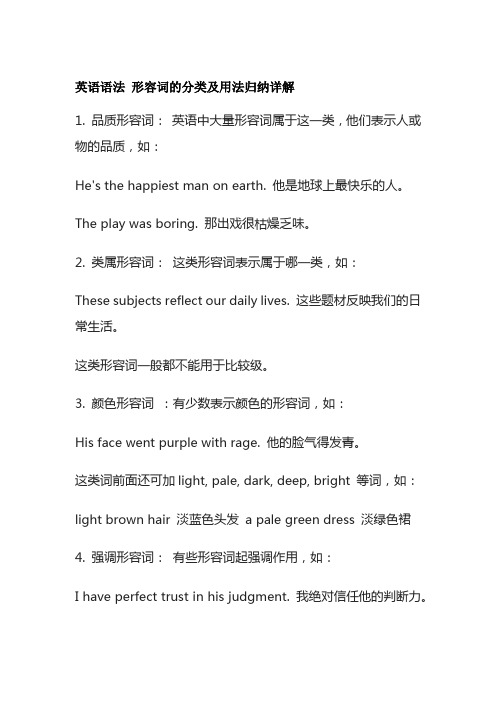
英语语法形容词的分类及用法归纳详解1. 品质形容词:英语中大量形容词属于这一类,他们表示人或物的品质,如:He's the happiest man on earth. 他是地球上最快乐的人。
The play was boring. 那出戏很枯燥乏味。
2. 类属形容词:这类形容词表示属于哪一类,如:These subjects reflect our daily lives. 这些题材反映我们的日常生活。
这类形容词一般都不能用于比较级。
3. 颜色形容词:有少数表示颜色的形容词,如:His face went purple with rage. 他的脸气得发青。
这类词前面还可加light, pale, dark, deep, bright 等词,如:light brown hair 淡蓝色头发a pale green dress 淡绿色裙4. 强调形容词:有些形容词起强调作用,如:I have perfect trust in his judgment. 我绝对信任他的判断力。
5. -ing 形容词1)有大量现在分词正在或已经变为形容词,如:It was a tiring journey. 这真是一趟累人的旅行。
2)一些-ing形容词并不与动词有关,如:a cunning trick 狡猾的计谋6. –ed形容词1)大多数-ed形容词都与及物动词有关,是由它们的过去分词变过来的,一般有被动意义,多数为品质形容词,如:I felt depressed. 我感到很沮丧。
2)有些-ed形容词可说是类属形容词,也由动词的过去分词变来,但不能用于比较级,如:。
She is a trained nurse. 她是一个受过训练的护士。
3)有少数-ed形容词,不是由动词,而是由名词变来的:skilled workers 技术工人4)有些-ed 的形容词包含有副词:a well-equipped army 一支装备精良的部队a well-known musician 著名的音乐家7. 合成形容词1)形容词在英语中是比较普遍的,最常见的有:a. 形容词+名词+ed: good-natured 天性善良的b. 形容词+现在分词:easy-going 好说话的c. 名词+现在分词:heart-breaking 令人心碎的2)还有一些其他类型的合成形容词,如:a two-piece suit 两件套的西服all-out attempt 全力以赴的努力3)还有一些三个或更多词构成的合成形容词,如:heart-to-heart talk 推心置腹的谈话An out-of-date driving license 过期驾照一. 形容词的定义和用法:形容词用来修饰名词或代词, 表示人或事物的性质, 状态,和特征。
高中英语语法之形容词与副词

新旧+颜色+国籍+材料+ 新旧+颜色+国籍+材料+名词
old + brown + wood + table
副词的定义 副词的定义与分类 定义与
副词主要用来修饰动词,形容词,副词或 副词主要用来修饰动词,形容词,副词或 其他结构。 时间和频度副词: 副词:
now, then, often, always, usually, early, today, late, next, last day, already, generally, frequently, seldom, ever, never, yet, soon, too, immediately, finally, shortly, before, ago, sometimes, yesterday, once,twice … once,
高中英语语法之
形容词与 形容词与副词
形容词定义 形容词定义与分类 定义与
形容词分成性质形容词和叙述形容词 形容词分成性质形容词和叙述形容词
直接说明事物的性质或特征的形容词是 直接说明事物的性质或特征的形容词是性质形 容词,它有级的变化,可以用程度副词修饰, 容词,它有级的变化,可以用程度副词修饰, 在句中可作定语、表语和补语。 在句中可作定语、表语和补语。
You speak English very well. well. Food here is hardly to get. We could see very clearly a strange light ahead of us. Let's be out. out. Let him out! out! Are you old enough to go to school? The villagers there are busy getting in wheat.
高考英语语法知识梳理之形容词
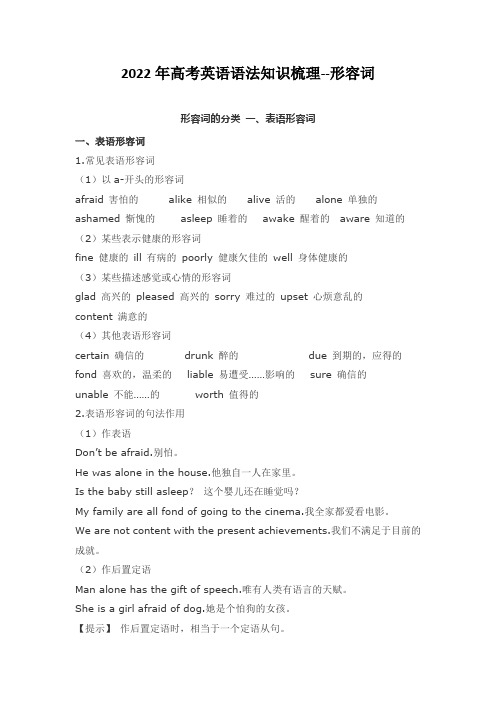
2022年高考英语语法知识梳理--形容词形容词的分类一、表语形容词一、表语形容词1.常见表语形容词(1)以a-开头的形容词afraid 害怕的alike 相似的alive 活的alone 单独的ashamed 惭愧的asleep 睡着的awake 醒着的aware 知道的(2)某些表示健康的形容词fine 健康的ill 有病的poorly 健康欠佳的well 身体健康的(3)某些描述感觉或心情的形容词glad 高兴的pleased 高兴的sorry 难过的upset 心烦意乱的content 满意的(4)其他表语形容词certain 确信的drunk 醉的due 到期的,应得的fond 喜欢的,温柔的liable 易遭受……影响的sure 确信的unable 不能……的worth 值得的2.表语形容词的句法作用(1)作表语Don’t be afraid.别怕。
He was alone in the house.他独自一人在家里。
Is the baby still asleep?这个婴儿还在睡觉吗?My family are all fond of going to the cinema.我全家都爱看电影。
We are not content with the present achievements.我们不满足于目前的成就。
(2)作后置定语Man alone has the gift of speech.唯有人类有语言的天赋。
She is a girl afraid of dog.她是个怕狗的女孩。
【提示】作后置定语时,相当于一个定语从句。
He is the greatest writer alive.他是当今最伟大的作家。
He is the greatest writer who is alive.(3)作宾语补足语Scientists found these birds alike in many ways.科学家发现这些鸟在许多方面相似。
高中语法之形容词 副词
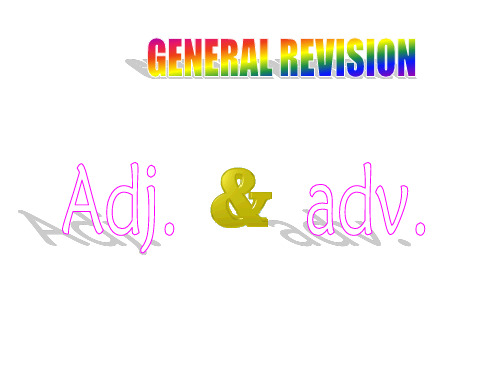
… too+原级+ to do sth.
He is too young to join the army. 形容词原级+ enough to do sth. This truck is big enough to carry 5 tons.
比较级+than…
Our school is larger than theirs. This bridge is longer than that one.
He made us happy.
Colour it green.
Attention : • 有些单词以-ly结尾,但却是形容词而非副 词: • lively、lonely、lovely、deadly、friendly、 ugly、silly、likely、 timely 、 brotherly sisterly motherly fatherly 等。
巧记: 特殊形式比较级 共有三对二合一 坏病两多并两好 little意思不是小 一分为二有两个 一是老来二是远
as+形容词原形+as Tom is as tall as Mike. Tom is three times as old as Mike. There are as many students in our school as yours.
注意 no/ not + 比较 级 + than 的特殊含义
• A is no more careful than B. • A和B两人都不仔细。 • A is not more careful than B. • A不如B仔细。
• more…. than…与其说…倒不如说 • It is more like a wall than a spear. • They are more like father and son than teacher and student. • more than + n. / num. / adj. • There are more than fifty students in our class. • He is more than a teacher; he is our friend. • She is more than kind to us all.
英语语法之形容词副词

英语语法之形容词、副词一、定义:形容词是用来修饰和形容名词,说明人与事物性质和特征的词。
副词是用来修饰动词、形容词、副词或整个句子。
二、比较级和最高级的构成方法:1.单音节词和少数双音节词比较级和最高级的规则变化:2. 其他双音节词或多音节词,在该词前面加-more/mostbeautiful—more beautiful—(the) most beautiful3. 由形容词加ly构成的双音节词和多音节词,都是在该词前加-more/most.quickly—more quickly—(the) most quicklydifficultly—more difficultly—(the) most difficultly4. 不规则变化:不规则变化记忆口诀:特殊形式比较级,共有三对二合一。
病坏两多并两好,little意少不是小。
一分为二也三个,距离老远常迟到。
三、形容词比较级和最高级的用法:1. 原级的用法:用于两者之间对比,意思为“……和……相同”A+v.+as….+形容词原级+as BTom is as honest as Jack.2.比较级的用法:①A+形容词比较级+than+ BBeijing is more beautiful than Tianjin.形容词比较级前还可以用much, even, still, a little,far, a lot, a bit, much more来修饰,very, so, too, quite 不能修饰比较级。
②数字+形容词比较级+thanI’m two years older than you.She is a head taller than me.③比较级+and+比较级,表示“越来越……”The earth is getting warmer and warmer.China becomes more and more stronger.④the +比较级,the +比较级结构,表示“越……就越……”The more I study it, the more I like it.⑤which/who +is +比较级Which city is bigger, Beijing or Tianjin?Who is happier, you or me?3. 最高级用法:用于三者及以上的人或事物的比较,最高级前加the,后面跟带in或of表范围的短语。
高考英语语法之形容词和副词

高考英语语法之形容词和副词第一部分考点精讲精练第1讲比较级考点1.可以修饰比较级的词常用来修饰比较级的词或短语有:a bit, a little, rather, much, far, by far, many, a lot, a great deal, any, still, even等。
by far的用法:用于强调,意为―……得多‖ ―最最……‖ ―显然‖等,可修饰形容词或副词的比较级和最高级,通常置于其后,但是若比较级或最高级前有冠词,则可置于其前或其后。
如:It’s quicke r by far to go by train. 乘火车要快得多。
She ran fastest by far. 她跑得最快(显然她跑得最快)。
He’s by far the cleverer student.他是个聪明得多的孩子。
He is by far the best teacher.=He is the best teacher by far.他是最最好的老师(或他显然是最好的老师)。
1.You are such a woman as always think ____ ofyourself than others.A. muchB. much moreC. littleD. much less2.【2004福建】The number of people present at theconcert was _____than expected. There were many ticket left.A. much smallerB. much moreC. much largerD. many more3.-The novel is, I have to say, not a bit interesting,How do you find it?-Why! It’s ____________ that I have ever read.A. a most interestingB. a more interestedC. a less interestingD. by far the most interesting4.【2007 全国II】After two years’ research, we no whave a ____ better understanding of the disease.A. veryB. farC. fairlyD. quite5.------ The disease he suffers is not easy to cure.------ I know, but is he _____ better?A. muchB. ratherC. anyD. little6.【2000上海】You're standing too near the camera.Can you move ______ ?A. a bit farB. a little fartherC. a bit of fartherD. a little far7.【2006江苏】I wish you’d do ________ talking andsome more work. Thus things will become better.A. a bit lessB. any lessC. much moreD. a little more考点2.more 、much与比较级more 和多音节形容词和副词一起构成比较级,如more interesting, more exciting单音节词和部分双音节词在后面加-er构成比较级.如:taller, earlier, hottermuch修饰比较级。
高中英语语法总结大全之形容词和副词
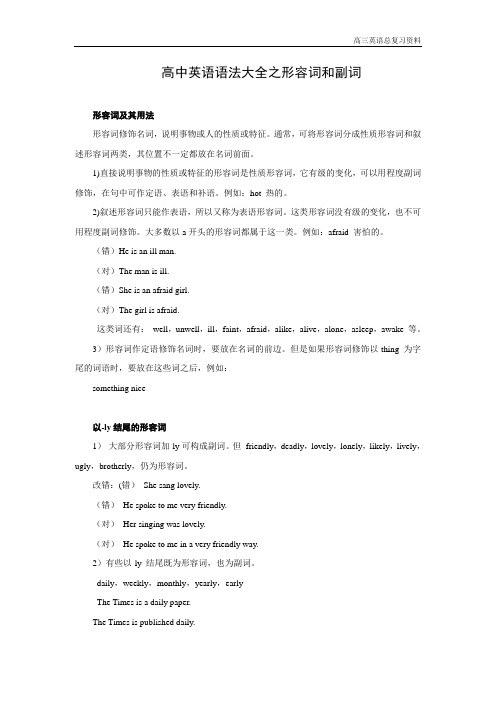
高中英语语法大全之形容词和副词形容词及其用法形容词修饰名词,说明事物或人的性质或特征。
通常,可将形容词分成性质形容词和叙述形容词两类,其位置不一定都放在名词前面。
1)直接说明事物的性质或特征的形容词是性质形容词,它有级的变化,可以用程度副词修饰,在句中可作定语、表语和补语。
例如:hot 热的。
2)叙述形容词只能作表语,所以又称为表语形容词。
这类形容词没有级的变化,也不可用程度副词修饰。
大多数以a开头的形容词都属于这一类。
例如:afraid 害怕的。
(错)He is an ill man.(对)The man is ill.(错)She is an afraid girl.(对)The girl is afraid.这类词还有:well,unwell,ill,faint,afraid,alike,alive,alone,asleep,awake 等。
3)形容词作定语修饰名词时,要放在名词的前边。
但是如果形容词修饰以-thing为字尾的词语时,要放在这些词之后,例如:something nice以-ly结尾的形容词1)大部分形容词加-ly可构成副词。
但friendly,deadly,lovely,lonely,likely,lively,ugly,brotherly,仍为形容词。
改错:(错)She sang lovely.(错)He spoke to me very friendly.(对)Her singing was lovely.(对)He spoke to me in a very friendly way.2)有些以-ly 结尾既为形容词,也为副词。
daily,weekly,monthly,yearly,earlyThe Times is a daily paper.The Times is published daily.用形容词表示类别和整体1)某些形容词加上定冠词可以泛指一类人,与谓语动词的复数连接。
英语语法之形容词 副词

练一练
• 4) Whose bag is _______ ( heavy ), yours or mine? 5) Does Jim run as slow _______(slow ) as David? Yes, but Mike slower ( slow ) than them. runs_______ • 6) You have seven books, but I more ( many ) than you. I have _______ have ten.
词汇
• • • • • • Chinese math English computer 语文 数学 英语 电脑 music art painting P.E. science 音乐 美术 绘画 体育 科学 moral education social studies 思想品德课 社会课
三种形式
• 1、形容词表示某一事物或人的特征, 副词表示某一动作的特征。 • 形容词和副词有三种形式:原形、比 较级、最高级。 • 比较级:后+er 或 前+more 如 taller, more careful • 最高级:the …+est 或 the most … 如 the tallest, the most careful
heavier
练一练
farther ( far ) than • 7) I jump _______ some of the boys in my class. thin ( thin ), but 8) I’m very____ she’s thinner _____ ( thin ) than me. warmer warmer ( 9) It gets ______and______ warm ) when spring comes here.
英语语法之形容词副词篇
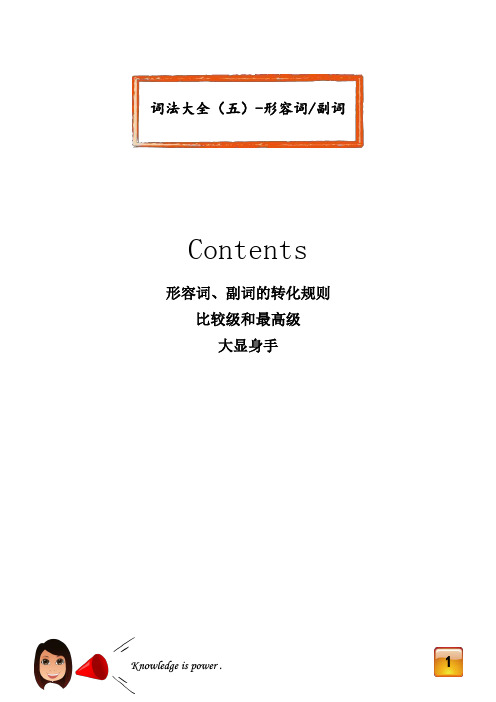
词法大全(五)-形容词/副词Contents 形容词、副词的转化规则比较级和最高级大显身手形容词/副词形容词:修饰名词或代词副词:修饰动词、形容词或整句Miss Yang is a woman. (beautiful, beautifully)The dog is dancing . (happy, happily)He is with me. (angry, angrily)He looks today. (happy, happily)Listen . (careful, carefully)Don’t drive so . (quick, quickly)形容词和副词的转化规则一般直接加ly.loud → loudly quiet → quietly slow → slowlycareful → carefully quick→ quickly bad → badly二般以辅音字母+y 结尾的形容词,变“y”为i 再加ly.happy → happily easy → easily angry → angrily heavy → heavily 三特good-well true-truly terrible-terribly特中之特late-late early-early high-high fast-fast特中之特中之特hard-hard形容词的比较级和最高级比较级用于两者之间的比较Liu Xiang is taller than Pan Changjiang.最高级用于三者及三者以上的比较Yao Ming is the tallest of the three.of the three, of them all, in our class, in China比较级和最高级的变化规则一般加er 或est二般以不发音的字母e 结尾,加r 或stlarge strange wide safe三般以辅音字母+y 结尾,变y 为i,加er 或esthappy angry hungry busy lazy heavy lucky lovely early四般以重读辅元辅结尾,双写尾字母加er 或estfat thin big hot sad wet五般多音节词加more 或the mostbeautiful important difficult interesting famous exciting delicious特殊:clever 的比较级和最高级有两种cleverer the cleverestmore clever the most clever六特g ood -better-the bestbad -worse-the worstmany/much-more-the most鬼比神功1.much/a little + 形容词比较级。
语法专项之形容词和副词

hardly
位于情态动词、助动词、be动词之后,实义动 词之前 hardly ever 几乎从不,表频率
二、副词
3. 常用易混副词(短语) (1) ago与before
易混词 意义及用法
ago
表示以现在为基准的“以前”,和
表示时间概念的短语搭配使用,
常用于一般过去时
before
表示以过去为基准的“以前”,常 用于过去完成时
泛指以前,常用于现在完成时
例句
The meeting began five minutes ago. 会议5分钟前就开始了。
放在系动词之后
放在宾语之后,常与find, keep, leave, make, think等连用,表示宾语的性质或状态等 放在句末,前面有逗号
一、形容词
如:
a cold morning something important Silk feels soft. He always makes us happy.
或助动词之后,实义动词之前 我也会游泳。
as well
“也”,一般用于肯定句,只放 I like you as well.
在句末
我也喜欢你。
二、副词
3. 常用易混副词(短语) (3) already, yet与still
考点 already
用法 已经;早已 已经,都
yet
已经
还
still
仍然;还
多用于完成时态的肯定句中
He arrived home, hungry and tired.
一个寒冷的早晨(作定语) 一些重要的事情(作定语) 丝绸摸起来很柔软。(作表语)
他总是使我们高兴。(作宾语补 足语)
英语语法之形容词副词

英语语法之形容词副词英语语法之形容词副词形容词,副词的比较级:表示“比…更…”(-er)(一):一般直接在单音节和少数双音节形容词,副词尾+;tallLong(二):以e结尾的单音节和少数双音节形容词,副词词尾直接+_______;nice______wide_______(三):“以_____+______结尾的单音节和少数双音节形容词,副词先___变____,再加____。
busy______early______easy________busy_______(四):以______音节结尾,末尾只有一个辅音字母(辅元辅)的单音节和少数双音节的形词,副词,要_____最后一个辅音,再+______。
big_____hot_____red____thin_____(五):多音节和部分双音节的形同此,副词,一般在此类词前面+__________构成最高级形式。
interesting_________relaxing___________exciting__________carefully_ __________注意:(1)比较级的句子中最常见的一个词than比。
(2)比较级常用于两者的'比较。
形容词,副词的最高级:表示“最……”(-est)(一):一般直接在单音节和少数双音节形容词,副词尾+;tallLongOldLow(二):以e结尾的单音节和少数双音节形容词,副词词尾直接+___________;nice______wide_______large_______fine______(三):“以_____+______结尾的单音节和少数双音节形容词,副词先___变____,再加____。
busy______early______easy________busy_______(四):以______音节结尾,末尾只有一个辅音字母(辅元辅)的单音节和少数双音节的形容词,副词,要_____最后一个辅音,再+______。
- 1、下载文档前请自行甄别文档内容的完整性,平台不提供额外的编辑、内容补充、找答案等附加服务。
- 2、"仅部分预览"的文档,不可在线预览部分如存在完整性等问题,可反馈申请退款(可完整预览的文档不适用该条件!)。
- 3、如文档侵犯您的权益,请联系客服反馈,我们会尽快为您处理(人工客服工作时间:9:00-18:30)。
定语形容词和表语形容词
• 一般说来,形容词既可作定语又可作表语,但是,有些形容词 只用于名词前作定语,它们被称为定语形容词,而另有一些形 容词则只用作表语,它们被称为表语形容词。
理的
1. The wounded soldier looked ___ , but his weak breath suggested that he was still ___.
a. died; alive b. dead; alive c. death; living c. dead; y 2. The cake she made looks ____, but it tastes
• 表示极限意义,用 quite(完全),completely(完全),absolutely(绝对), altogether (完全),entirely(完全),totally(完全)等。
• You are completely wrong. 你完全错了。 • It’s absolutely impossible. 这是完全不可能的。 • The theatre was not quite full. 剧院尚未全满。 • That’s a totally different matter. 那完全是另一回事。 • It is more impossible for me to do this thing than for him (错) •
• 1.等级形容词等级形容词和非等级形容词
• 等级形容词通常是指有比较级和最高级的形容词。通常 可以用程度副词修饰。
• Expensive cheap nice good delicious • Happy difficult easy interesting bored… • The weather was too cold. • It was an extremely difficult task. • It’s quite expensive. • I’m rather hungry. • This story is much more interesting than that one. • Tom is the highest student in his class
• School is an everyday event for most children. • 对大多数孩子来说,上学是每天都要做的事。
• 2. 常见的表语形容词
• 连系动词之后的成分叫做表语:
• 连系动词有:be become get grow feel appear look keep smell sound stay taste turn remain.
poor large big… • 2. 合成形容词 • 由两个或两个以上的单词构成的形容词 • Three-year-old second-hand waterproof tax-free
time-consuming
• 3. 派生形容词 • 由名词或动词加词缀衍生出来的形容词 • Fool-foolish enjoy-enjoyable • Wind-windy sun-sunny care-careful-careless • Interest-interested-interesting • Please-pleasant- pleasing-pleased • Forget-forgetful –forgettable • Amuse-amusing-amused • Danger-dangerous • Satisfy-satisfactory—satisfying- satisfied
高中英语语法讲解
形容词和形容词词组 (Adjectives and Adjective Phrases)
形容词的学习要点
• 形容词的分类 • 形容词的句中位置 • 形容词的句法功能 • 形容词的比较级及最高级用法 • 形容词词组的构成
形容词的分类
• 按照词的构成 • 1. 简单形容词 • Long honest short slow fast difficulty easy good
• 英语中的类别形容词(即表示所修饰名词类别的 形容词)通常都是非等级形容词
• daily 每日的 monthly 每月的 yearly 每年的 • northern 向北的 southern 向南的 western 向
南的 • Chinese 中国的 British 英国的 Japanese • male 男性的 female 女性的 • electric 电动的 medical 医学的 physical 物
• 1. 常见的定语形容词有 • elder(年岁较大的), eldest(最年长的), indoor (室内的),
outdoor(室外的), daily(每天的), everyday(每天的), weekly(每周的), monthly(每月的), yearly(每年的), last(最后 的), wooden(木制的), woolen(毛纺的)等。 • I like wooden furniture. 我喜欢木制家具)
• 2.非等级形容词
• 即指其含义已经包括绝对意义或极限意义的形容词.通常不用于比较级和 最高级。
• perfect 完美的,impossible 不可能的,full 满的,empty 空的, unique 唯一的,enough 足够的,flawless完美的,right 正确的, wrong 错误的,sure 确信的,certain 确信的,different 不同的等,要 加强非等级形容词的意义,可使用以下副词:
